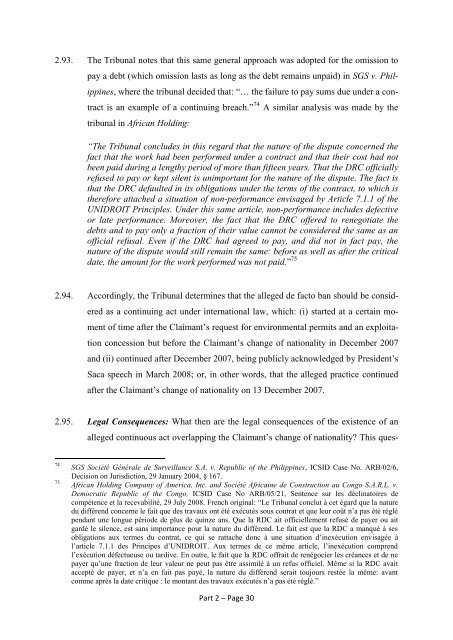brought under the dominican republic - central america - ita
brought under the dominican republic - central america - ita
brought under the dominican republic - central america - ita
Create successful ePaper yourself
Turn your PDF publications into a flip-book with our unique Google optimized e-Paper software.
2.93. The Tribunal notes that this same general approach was adopted for <strong>the</strong> omission to<br />
pay a debt (which omission lasts as long as <strong>the</strong> debt remains unpaid) in SGS v. Philippines,<br />
where <strong>the</strong> tribunal decided that: “… <strong>the</strong> failure to pay sums due <strong>under</strong> a contract<br />
is an example of a continuing breach.” 74 A similar analysis was made by <strong>the</strong><br />
tribunal in African Holding:<br />
―The Tribunal concludes in this regard that <strong>the</strong> nature of <strong>the</strong> dispute concerned <strong>the</strong><br />
fact that <strong>the</strong> work had been performed <strong>under</strong> a contract and that <strong>the</strong>ir cost had not<br />
been paid during a lengthy period of more than fifteen years. That <strong>the</strong> DRC officially<br />
refused to pay or kept silent is unimportant for <strong>the</strong> nature of <strong>the</strong> dispute. The fact is<br />
that <strong>the</strong> DRC defaulted in its obligations <strong>under</strong> <strong>the</strong> terms of <strong>the</strong> contract, to which is<br />
<strong>the</strong>refore attached a situation of non-performance envisaged by Article 7.1.1 of <strong>the</strong><br />
UNIDROIT Principles. Under this same article, non-performance includes defective<br />
or late performance. Moreover, <strong>the</strong> fact that <strong>the</strong> DRC offered to renegotiate <strong>the</strong><br />
debts and to pay only a fraction of <strong>the</strong>ir value cannot be considered <strong>the</strong> same as an<br />
official refusal. Even if <strong>the</strong> DRC had agreed to pay, and did not in fact pay, <strong>the</strong><br />
nature of <strong>the</strong> dispute would still remain <strong>the</strong> same: before as well as after <strong>the</strong> critical<br />
date, <strong>the</strong> amount for <strong>the</strong> work performed was not paid.” 75<br />
2.94. Accordingly, <strong>the</strong> Tribunal determines that <strong>the</strong> alleged de facto ban should be considered<br />
as a continuing act <strong>under</strong> international law, which: (i) started at a certain moment<br />
of time after <strong>the</strong> Claimant‟s request for environmental permits and an explo<strong>ita</strong>tion<br />
concession but before <strong>the</strong> Claimant‟s change of nationality in December 2007<br />
and (ii) continued after December 2007, being publicly acknowledged by President‟s<br />
Saca speech in March 2008; or, in o<strong>the</strong>r words, that <strong>the</strong> alleged practice continued<br />
after <strong>the</strong> Claimant‟s change of nationality on 13 December 2007.<br />
2.95. Legal Consequences: What <strong>the</strong>n are <strong>the</strong> legal consequences of <strong>the</strong> existence of an<br />
alleged continuous act overlapping <strong>the</strong> Claimant‟s change of nationality? This ques-<br />
74<br />
75<br />
SGS Société Générale de Surveillance S.A. v. Republic of <strong>the</strong> Philippines, ICSID Case No. ARB/02/6,<br />
Decision on Jurisdiction, 29 January 2004, § 167.<br />
African Holding Company of America, Inc. and Société Africaine de Construction au Congo S.A.R.L. v.<br />
Democratic Republic of <strong>the</strong> Congo, ICSID Case No ARB/05/21, Sentence sur les déclinatoires de<br />
compétence et la recevabilité, 29 July 2008. French original: “Le Tribunal conclut à cet égard que la nature<br />
du différend concerne le fait que des travaux ont été exécutés sous contrat et que leur coût n‟a pas été réglé<br />
pendant une longue période de plus de quinze ans. Que la RDC ait officiellement refusé de payer ou ait<br />
gardé le silence, est sans importance pour la nature du différend. Le fait est que la RDC a manqué à ses<br />
obligations aux termes du contrat, ce qui se rattache donc à une situation d‟inexécution envisagée à<br />
l‟article 7.1.1 des Principes d‟UNIDROIT. Aux termes de ce même article, l‟inexécution comprend<br />
l‟exécution défectueuse ou tardive. En outre, le fait que la RDC offrait de renégocier les créances et de ne<br />
payer qu‟une fraction de leur valeur ne peut pas être assimilé à un refus officiel. Même si la RDC avait<br />
accepté de payer, et n‟a en fait pas payé, la nature du différend serait toujours restée la même: avant<br />
comme après la date critique : le montant des travaux exécutés n‟a pas été réglé.”<br />
Part 2 – Page 30

















